Infants frequently cry, which can often be upsetting for both the baby and the parents. Infants scream for a variety of reasons, but persistent crying may indicate discomfort or underlying problems such as colic, reflux, or constipation. Numerous research has looked into the possible advantages of probiotics in easing infant colic symptoms and lowering crying time. Probiotics are living microorganisms that improve the host's health and have come to light as a viable treatment to reduce newborns' crying periods. Based on knowledge from recent studies and research, we will examine three methods in this blog article that probiotics can minimize infants' crying time.
Management of Colic: Colic is characterized by excessive crying, often occurring in otherwise healthy infants. It is a common problem that many babies suffer from and can be distressing for parents. According to studies, lactobacillus reuteri DSM 17938 is an effective probiotic strain for treating colic in breastfed infants. According to a randomized clinical experiment, lactobacillus reuteri DSM 17938 dramatically decreased infants' crying time, which in turn decreased the symptoms of colic. Therefore, incorporating probiotics into the management of colic can be a valuable strategy to decrease crying time in affected infants.

Prevention of Excessive Crying:
Probiotics have been researched for their possible contribution to the reduction of excessive cries in newborns. The ability of probiotics to control and stop crying in babies as young as three months old has been researched. The review suggests that probiotics may help prevent excessive crying, but more research is necessary. By giving probiotics to newborn children in their initial months of life, lessening the frequency and level of excessive crying times in them might be possible.
Improvement of Gastrointestinal Function: Constipation and regurgitation, as well as other gastrointestinal discomforts, can be linked to infant crying. Probiotics have demonstrated promise in enhancing digestive health and easing symptoms associated with certain illnesses. According to studies, taking probiotic supplements, especially those containing Lactobacillus strains, can reduce the frequency of regurgitation and enhance bowel movements. Probiotics can help decrease crying episodes linked to gastrointestinal pain by encouraging a healthy gut environment.
Early probiotic supplementation in an infant's life may have a greater impact on reducing crying time and managing colic symptoms. According to a prospective clinical trial enrolling term babies, oral supplementation with Lactobacillus during the initial three months of life led to a substantial reduction in crying time, an increase in bowel movements, and a decrease in regurgitation episodes. Therefore, adding probiotics to an infant's routine in the first few months may be most beneficial for reducing the symptoms of colic.
To ensure the effectiveness of probiotics in decreasing crying time, it is crucial to follow proper dosage and administration guidelines. Probiotics should be administered in adequate amounts as recommended by healthcare professionals or the specific product instructions. Consistency in consuming probiotics is the key to achieving desired results.
Children who take probiotics have a low risk of experiencing negative side effects. However, it's crucial to keep in mind that not all probiotic strains are equally efficient for treating various therapeutic problems. Therefore only those having safety and adequacy information should be recommended. In order to choose probiotics that are beneficial for treating particular problems in children, they must have been researched.
Conclusion:
Probiotics may help reduce infants' crying times, especially in situations of colic, excessive crying, and digestive problems like regurgitation and constipation. Specific probiotic strains, such as Lactobacillus, have shown promise in lowering infants' crying periods and enhancing gastrointestinal health. Probiotics offer a secure and well-tolerated alternative for parents looking to reduce excessive crying in their children, even if more research is still required to determine the best dosages, treatment plans, and their usefulness in various infant populations. It is always advised to speak with a healthcare provider if you are worried about your baby's weeping in order to receive a good diagnosis and advice on how to include probiotics in their treatment.
Wink provides quick-melt tablets with combined prebiotics and probiotics to improve intestinal health. The supplement is suitable for the entire family, from infants to adults, and comes in a huckleberry flavor. You can go through their products on the website and choose a healthy life for your family.
Read More.
What is a colony-forming unit?







Leave a comment
All comments are moderated before being published.
This site is protected by hCaptcha and the hCaptcha Privacy Policy and Terms of Service apply.